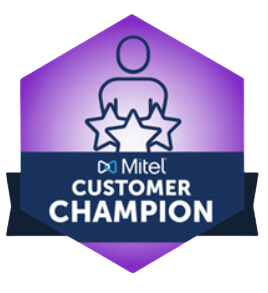Why AI for Small Business Is A Game Changer

Artificial Intelligence (AI) has revolutionized our daily lives and professional environments, permeating virtually every aspect of our activities. It has transformed how we search for and process information, as well as the way we engage with others.
Once viewed as complex, AI was deemed exclusive to larger corporations, limiting its adoption by business leaders. However, with the increasing accessibility of AI systems, especially in communication platforms, this notion is no longer accurate.
AI has the potential to empower small and medium-sized businesses (SMBs) as effectively as it does for larger counterparts. Surveys indicate that up to 91% of small business leaders believe AI has contributed to the success of their companies. Mark Sher, Intermedia’s SVP of Product Marketing, highlights AI’s transformative impact and the commitment to SMB accessibility.
“As AI reshapes the business landscape, Intermedia recognizes that its impact extends far beyond larger enterprises. Our commitment lies in making the transformative power of AI accessible to SMBs,” said Mark Sher, SVP of Product Marketing at Intermedia.
“Intermedia empowers SMBs with AI solutions that enhance productivity, upgrade business insights, improve customer care, update security and compliance, reduce errors, and unlock opportunities for innovation and profitability. The era of AI exclusivity for big budgets is over; Intermedia is ushering in an era where intelligent innovation benefits businesses of all sizes.”
The Impact of AI For Small Business
A significant majority, specifically 87% of organizational leaders, are confident that the integration of AI and machine learning will contribute to enhancing customer experiences, improving efficiency, and driving revenue growth. SMBs can harness AI, such as generative AI and natural language processing, for significant growth opportunities. Partnering with the right solution provider enables companies to:
Boost Productivity and Streamline Operations:
The core success of any business hinges on the productivity and efficiency of its team members. As businesses undergo evolution and workflows become more intricate, heightened productivity and efficiency become essential for organizational success. AI emerges as a transformative force capable of driving these positive changes.
AI streamlines repetitive tasks, ensuring employees access data effortlessly for informed decision-making. Utilizing Natural Language Processing (NLP), a system can automatically transcribe audio and video calls, along with voicemails and customer interactions. Some advanced solutions can even autonomously identify key topics and action items, providing valuable guidance for today’s workforce.
AI integration reduces time on tasks like analyzing recordings, allowing team members to focus on effective information utilization.
Enhance Business Intelligence:
Data stands out not only as the world’s most valuable resource but also as a critical tool for companies. Effective decision-making, whether in scheduling or CX initiatives, hinges on utilizing data efficiently.
Transforming raw data into insights is complex, particularly with the surge in daily information generation by companies. AI excels in handling vast amounts of data and translating it into valuable insights.
AI is crucial for decoding the customer journey and understanding target audience preferences, especially in contact center support. Intelligent tools swiftly pinpoint areas for improvement in business processes. A tool with sentiment analysis distinguishes actions that build customer loyalty from those causing churn.
Enhance Customer Care (and Foster Loyalty):
AI transforms customer engagement. 73% prioritize customer experience, emphasizing the paramount importance of effective customer support in business choices.
As consumer expectations evolve, adapting to dynamic changes becomes intricate without the right tools. AI provides diverse avenues for enhancing customer interactions. Sentiment analysis tools assist companies in gauging customer sentiments regarding specific conversations and services.
AI-generated interaction summaries offer agents valuable insights for elevating the customer experience through personalization and data-driven strategies. Tools boost contact center efficiency with intelligent automation and AI agents for innovative self-service options. The cumulative effect is a faster and more efficient customer service experience.
Enhance Security and Compliance Measures:
Exceptional experiences, brand reputation, and compliance demand an upgraded approach to security and data protection. Even a minor mistake or human error can result in significant fines and customer loss.
AI offers the capability to automate and optimize various processes crucial for maintaining compliance. For example, intelligent tools can automatically identify sensitive data within customer conversations and redact such information from recordings and transcriptions.
AI tools vigilantly monitor agent-consumer conversations, swiftly alerting supervisors to any instances of non-compliance. This proactive approach establishes a more secure business environment, allowing companies to safeguard their intellectual property, consumers, and employees.
Reduced Errors and Enhanced Consistency:
Human expertise is essential, yet the common challenge for business leaders is the prevalence of human error in workflows. Engaging in repetitive tasks consistently can lead to occasional mistakes by staff members.
AI plays a crucial role in mitigating this challenge. Integrating AI and machine learning in technologies like contact centers and robotic automation speeds processes, reducing error risks.
AI systems can undergo training to adhere to standardized workflows tailored to the specific needs of businesses across various industries. Retailers, for example, can leverage AI to refine marketing strategies, predict customer requirements, and automate staffing decisions. Financial firms leverage AI to automate and improve precision in processes like creating customer quotes and invoices.
Opportunities for Innovation and Enhanced Profitability:
Companies confidently explore AI applications. Generative AI inspires advanced marketing, personalized services, and distinctive products, guiding companies effectively.
Companies leverage AI for enhanced customer service, offering intuitive self-help tools for secure payments and personalized product recommendations.
This avenue for innovation not only opens up possibilities for increased profitability but also enhances customer retention. Simultaneously, AI technology plays a role in reducing operational costs, contributing to the overall financial well-being of any business.
AI:
AI empowers SMBs, no longer exclusive to large corporations, as accessibility grows with user-friendly tools and customizable solutions. Innovators integrate user-friendly AI tools for customer service, marking the dawn of accessible intelligent innovation.
For SMBs, AI holds the potential to revolutionize productivity, efficiency, and profitability. AI unlocks insights, reduces errors, and transforms customer service, profoundly impacting smaller businesses.































